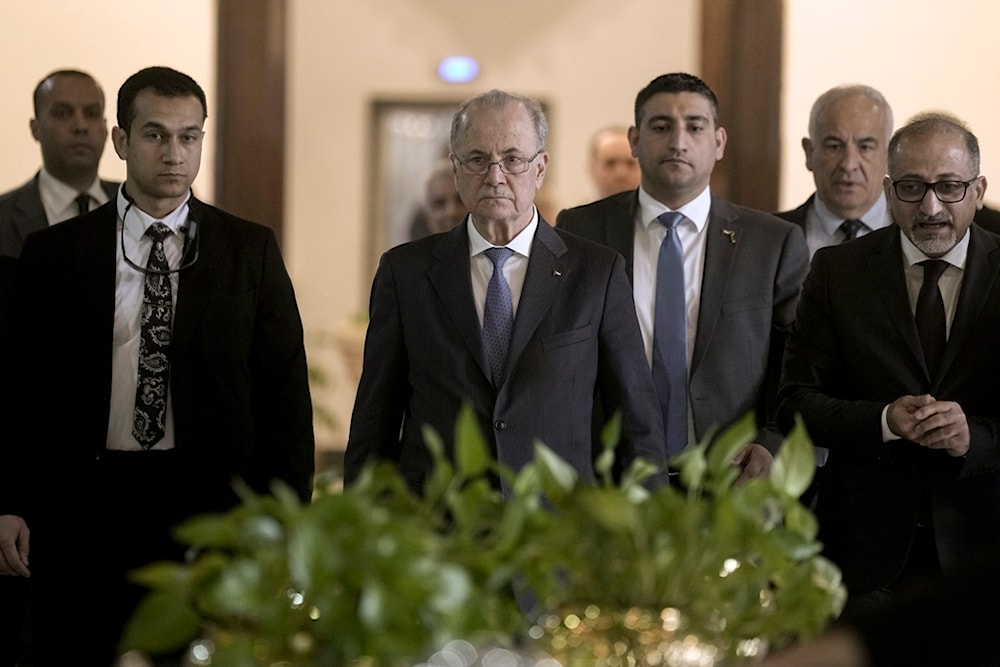Egypt to host emergency Arab summit on Palestine
Egypt will host an emergency Arab summit on February 27 to address the Palestinian crisis, as US President Donald Trump's proposal to "take over" Gaza and displace its population continues to face opposition.
-

Palestinian Prime Minister Mohammed Mustafa leaves after a meeting with Arab League Secretary-General Ahmed Aboul Gheit, at the Arab League headquarters in Cairo, Egypt, on Thursday, February 6, 2025 (AP)
Egypt will host an emergency summit of Arab nations on February 27 to address "the latest serious developments" concerning the Palestinian territories, the Egyptian Foreign Ministry announced on Sunday.
The summit comes as Egypt intensifies efforts to rally regional opposition to US President Donald Trump's proposed plan to relocate Palestinians from Gaza to Egypt and Jordan while placing the Palestinian territory under US administration.
According to the statement, the meeting was convened "after extensive consultations by Egypt at the highest levels with Arab countries in recent days, including Palestine, which requested the summit, to address the latest serious developments regarding the Palestinian cause." Coordination with Bahrain, which currently chairs the Arab League, was also highlighted in the announcement.
On Friday, Egyptian Foreign Minister Badr Abdelatty engaged in discussions with regional counterparts from Jordan, Saudi Arabia, and the United Arab Emirates to reinforce opposition to any forced displacement of Palestinians.
Trump’s declaration that the US could "take over" Gaza has triggered shockwaves among American officials, Israeli right-wing circles, and Arab governments.
During an Oval Office meeting with Israeli Prime Minister Benjamin Netanyahu, Trump proposed transforming war-ravaged Gaza into the "Riviera of the Middle East" and inviting "the world's people" to settle there. His comments, made in front of 150 journalists, surprised even his closest advisors, as he suggested that the US would "own" the Palestinian territory.
Israeli officials present at the meeting, particularly those from Netanyahu’s delegation, reportedly reacted with enthusiasm.
A senior Israeli official described the meeting as "truly historic," praising Trump’s proposal as a "genius solution" to long-standing Israeli concerns. Right-wing Israeli figures interpreted his remarks as a green light for full Israeli occupation and settlement expansion in Gaza.
Arab leaders alarmed
Trump’s remarks came at a delicate moment in ongoing ceasefire negotiations between the Israeli occupation and Hamas, raising concerns that his plan could embolden both Netanyahu and Hamas to resume hostilities.
The proposal deeply alarmed regional leaders, particularly in Egypt, Jordan, and Saudi Arabia. These governments were already wary of Trump's previous remarks advocating for the displacement of Palestinians from Gaza.
In an immediate response, the Saudi Foreign Ministry issued a strongly worded rejection of Trump's claim that the kingdom would normalize relations with the Israeli occupation without Palestinian statehood. "The Saudi crown prince doesn’t want to be seen as being part of what Trump is talking about," a US source close to the Saudis said.
It remains uncertain how Trump formulated his idea of a US takeover of Gaza. Sources close to him suggest he was moved by the scale of destruction in the blockaded Strip and saw an opportunity for reconstruction, though his plan overlooked the historical trauma of Palestinian displacement. One US official claimed Trump put forward his proposal because he believed "no one else had any new ideas for Gaza."
Trump’s comments are also expected to complicate ongoing negotiations over the captives held by Hamas and the fragile ceasefire deal. Netanyahu, already under pressure from hardliners within the Israeli regime, may see Trump’s remarks as justification to extend the war effort.
King Abdullah II of Jordan is set to visit Washington next week, followed by Egyptian President Abdel Fattah el-Sisi. Both leaders are expected to confront Trump over his Gaza proposal, setting the stage for tense diplomatic meetings.

 4 Min Read
4 Min Read










